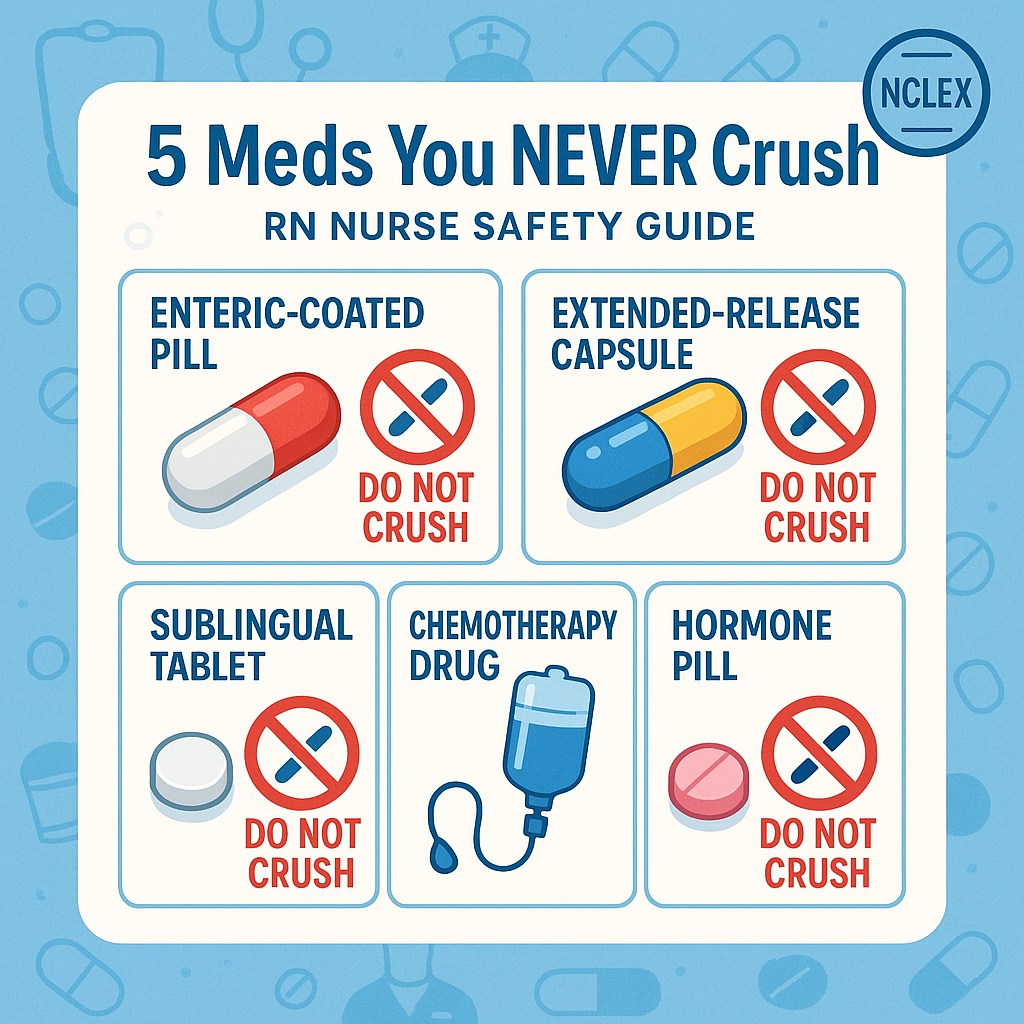In the fast-paced world of nursing, it’s easy to overlook simple yet critical safety steps — such as checking whether a pill can be crushed. However, for every nurse, especially those preparing for the NCLEX, understanding which medications must never be crushed is essential for safe patient care.
This guide will help registered nurses (RN nurses) and nursing students master this topic, strengthen their nursing bundle, and avoid serious medication errors.
🚫 Why Some Medications Should NEVER Be Crushed
Crushing or splitting the wrong pill can cause dangerous consequences. Some medications are specifically designed to release slowly or act in certain parts of the digestive tract. When that structure is altered, the drug may release too quickly or fail to work at all, leading to severe side effects, overdose, or reduced effectiveness.
Therefore, always remember this NCLEX golden rule:
👉 “If you’re not 100% sure a med can be crushed — DON’T!”
💊 5 Common Medications You Should Never Crush
Below are five common medication types that must not be crushed, broken, or chewed. These are frequent NCLEX questions and represent high-risk drugs every nurse should know.
1️⃣ Enteric-Coated Medications (EC)
Examples: Aspirin EC, Pantoprazole EC
Why Not Crush:
Because the coating protects the stomach from irritation or prevents the drug from being destroyed by stomach acid.
If Crushed:
Patients may experience stomach pain, ulcers, or loss of effectiveness.
NCLEX Tip:
Always check the label. If you see EC or “Enteric-Coated,” the pill must remain whole.
2️⃣ Extended-Release Medications (XR, ER, LA, SR)
Examples: Metoprolol XR, Oxycodone ER, Diltiazem SR
Why Not Crush:
These medications are designed to release slowly over several hours.
If Crushed:
The entire dose is released at once, creating a high risk of toxicity or overdose.
RN Nurse Tip:
Look for abbreviations such as XR, ER, SR, LA — and remember: Crushing = overdose risk.
3️⃣ Sublingual or Buccal Medications
Examples: Nitroglycerin SL, Buprenorphine
Why Not Crush:
They are formulated to dissolve under the tongue or inside the cheek for rapid absorption into the bloodstream.
If Crushed:
Swallowing changes how the drug is absorbed, making it less effective or completely inactive.
RN Nurse Advice:
Always remind patients to let these tablets dissolve naturally — never chew or swallow them.
4️⃣ Chemotherapy or Hazardous Drugs
Examples: Tamoxifen, Methotrexate
Why Not Crush:
These drugs are toxic and can harm both patients and healthcare workers if the powder becomes airborne.
If Crushed:
Exposure through skin contact or inhalation can occur, posing serious safety risks.
NCLEX Reminder:
Wear gloves and handle chemo drugs only when properly trained and protected.
5️⃣ Hormonal Medications or Coated Capsules
Examples: Finasteride, Hormone Replacement Pills
Why Not Crush:
Hormonal medications can cause harm if absorbed through the skin, particularly to pregnant staff.
If Crushed:
Unintentional hormone exposure becomes a serious hazard.
RN Nurse Note:
Pregnant nurses should avoid handling these medications entirely, whether crushed or not.
🔍 How to Know If a Medication Can Be Crushed
Before crushing any pill, double-check with reliable sources:
✅ The Do Not Crush List (available in most hospital systems)
✅ The drug label or MAR
✅ Your pharmacist — a nurse’s best resource for safety
✅ Trusted nursing reference tools from your nursing bundle
Whenever in doubt, pause and verify. This simple step can prevent life-threatening errors.
✅ Safe Medication Administration Tips for Nurses
As a nurse, you serve as the final checkpoint before a medication reaches the patient. Therefore, practice these safety habits consistently:
- Use liquid alternatives when patients cannot swallow pills.
- Never assume — always verify before crushing.
- Educate patients and families about medication safety at home.
- Apply the Six Rights of Medication Administration.
- During the NCLEX, read every medication question carefully — many scenarios test your ability to recognize unsafe actions like crushing pills.
🗝️ Key Takeaway
Ultimately, safe medication administration begins with awareness. By understanding which drugs must never be crushed and why, nurses can prevent serious errors, protect patients, and confidently answer NCLEX questions. Stay cautious, double-check every order, and always advocate for patient safety.

